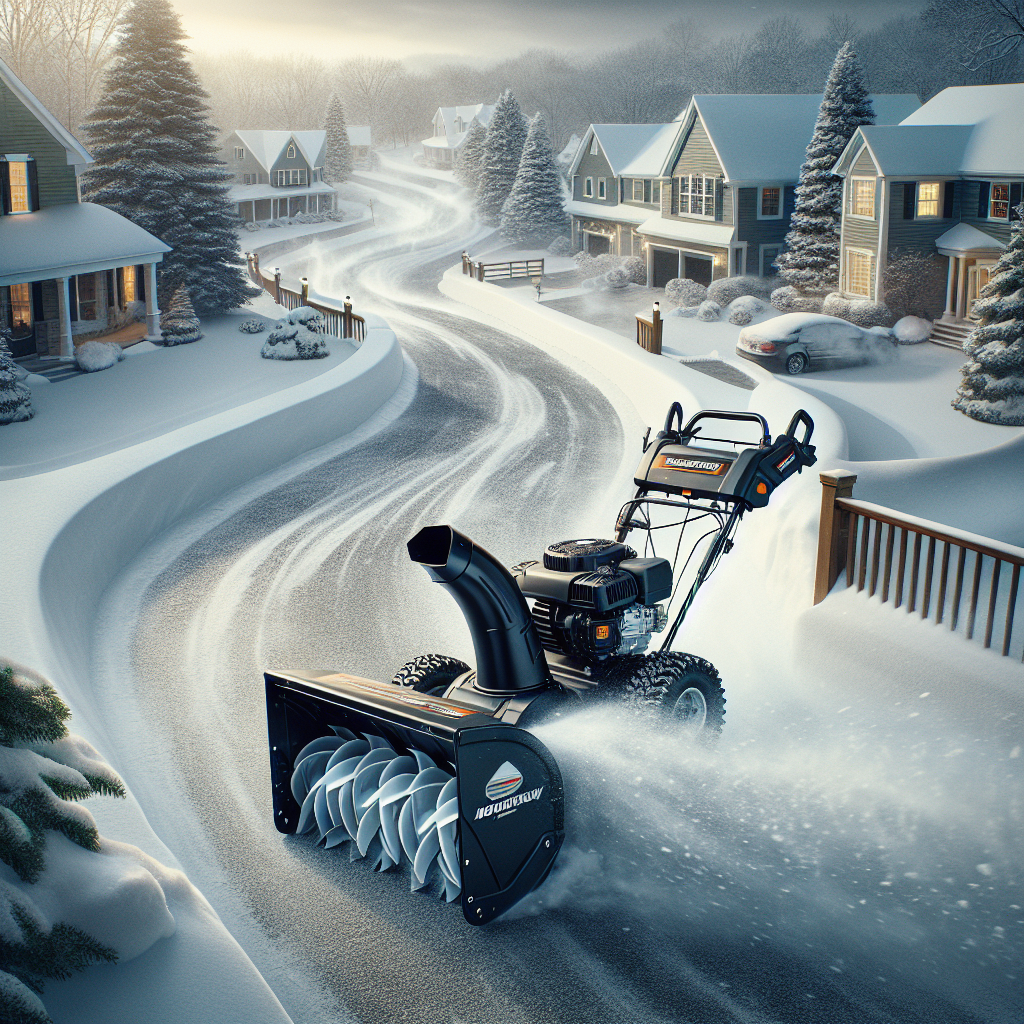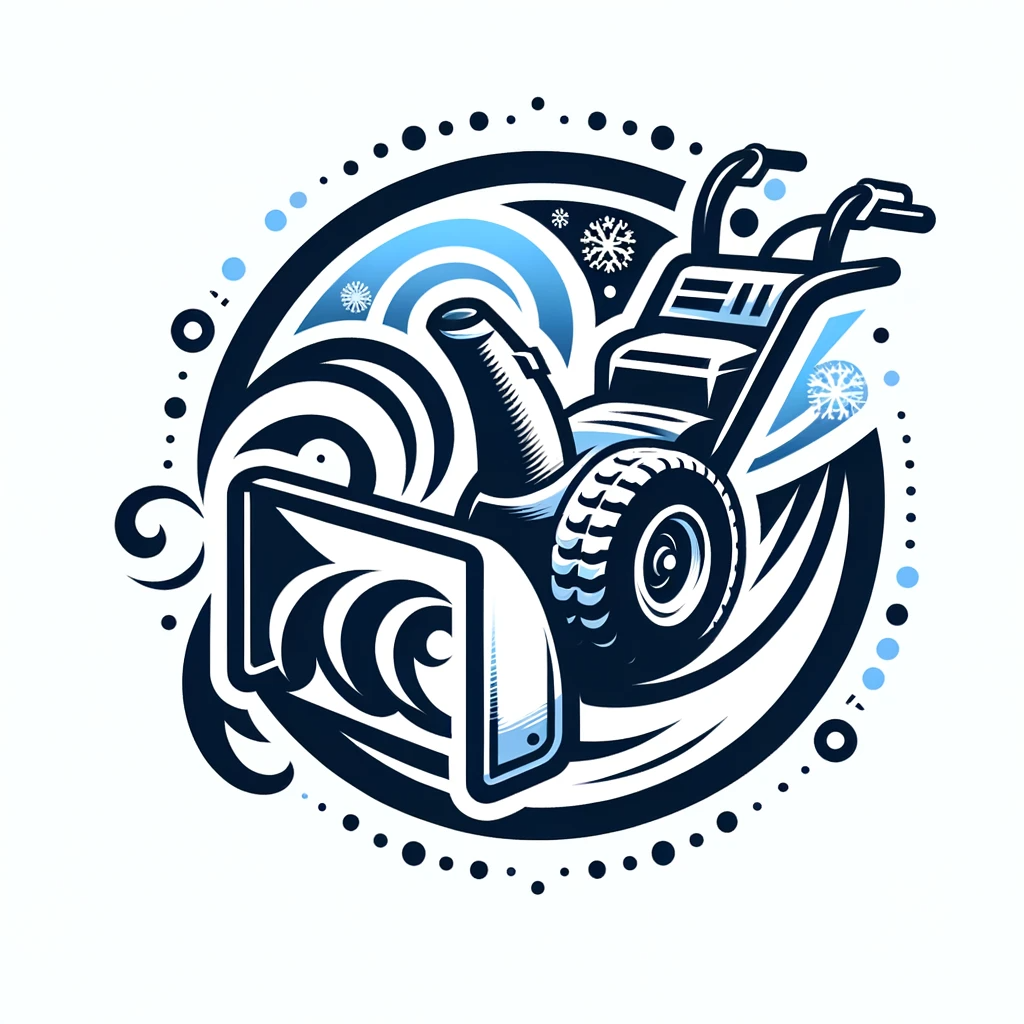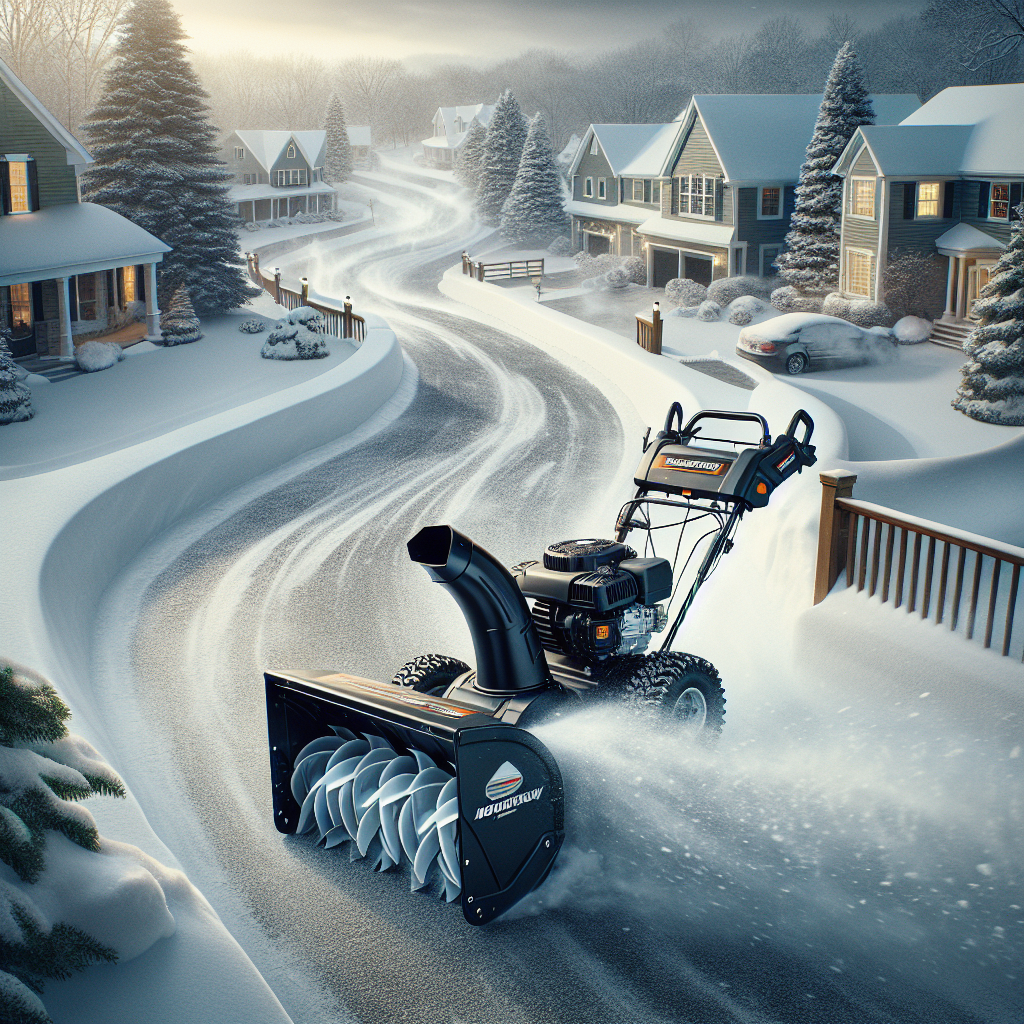So, you’ve woken up to a world covered in a fresh blanket of snow, and now you’re faced with the daunting task of clearing your driveway. The thought of countless hours spent shoveling may not be the most appealing, but fear not! In this article, we’ll explore the world of snow blowers and help you find the perfect one for your driveway. With several options available in the market, we’ll discuss the key factors to consider when choosing a snow blower so that you can make an informed decision and breeze through your winter chores effortlessly.

Factors to Consider When Choosing a Snow Blower
When it comes to choosing a snow blower for your driveway, there are several factors you should take into consideration. From the type of snow blower to the size and power, clearing width and depth, driveway surface, terrain, snowfall frequency, budget, noise level, and ease of use, each factor plays a crucial role in finding the perfect snow blower for your needs.
Types of Snow Blowers
There are three main types of snow blowers available on the market: single-stage, two-stage, and three-stage snow blowers.
Single-Stage Snow Blowers
Single-stage snow blowers are lightweight and compact, making them ideal for small driveways and lighter snowfall. They have an auger at the front that scoops up the snow and throws it out through a discharge chute. These types of snow blowers are usually more affordable and easy to maneuver.
Two-Stage Snow Blowers
Two-stage snow blowers are more powerful than single-stage snow blowers and are suitable for medium-sized driveways and heavier snowfall. They have an auger that scoops up the snow and a separate impeller that throws the snow out through the discharge chute. This two-stage process allows for better clearing of large amounts of snow.
Three-Stage Snow Blowers
Three-stage snow blowers are the most powerful and efficient option, designed for heavy-duty use and clearing large driveways. They have an auger that feeds the snow into an accelerator, which moves it into the impeller and then throws it out through the discharge chute. These snow blowers are capable of handling deep snow and icy conditions with ease.
Considerations Based on Driveway Size and Power
The size of your driveway plays a significant role in determining the type of snow blower you should choose.
Small Driveways
For small driveways, a single-stage snow blower is usually sufficient. These compact machines are easy to handle and maneuver, making it a breeze to clear snow from tight spaces. Additionally, their lightweight design makes them easy to store.
Medium-Sized Driveways
If you have a medium-sized driveway, a two-stage snow blower would be the ideal choice. These snow blowers offer more power and a wider clearing width than single-stage models, allowing you to clear your driveway quickly and efficiently.
Large Driveways
If you have a large driveway, a three-stage snow blower is your best bet. These heavy-duty machines can handle substantial amounts of snow and provide a wide clearing width, ensuring that your large driveway is cleared in no time.
Choosing the Right Clearing Width
The clearing width of a snow blower refers to the width of the path it can clear with each pass. The right clearing width depends on the size of your driveway and the amount of snowfall in your area.
Narrow Clearing Width
Snow blowers with narrow clearing widths are suitable for small driveways and areas with light snowfall. They are compact and easy to maneuver in tight spaces, making them an excellent choice for homeowners with limited storage space.
Medium Clearing Width
For medium-sized driveways and areas with moderate snowfall, snow blowers with medium clearing widths are the way to go. These machines can clear a wider path than their narrow counterparts, helping you save time and effort.
Wide Clearing Width
If you have a large driveway or live in an area with heavy snowfall, a snow blower with a wide clearing width is essential. These machines can clear a significantly wider path with each pass, enabling you to clear your driveway more efficiently.
Adjustable Clearing Width
Some snow blowers offer an adjustable clearing width, allowing you to customize the width according to your specific needs. This flexibility is particularly useful if you have various areas to clear, each requiring a different width.
Factors to Determine Clearing Depth
The clearing depth of a snow blower refers to how deeply it can remove snow from your driveway. Consider the following factors when determining the clearing depth you need.
Average Snowfall Depth
Take into account the average snowfall depth in your area when selecting a snow blower. If you typically experience light to moderate snowfall, a snow blower with a standard clearing depth will suffice. However, if you live in an area with heavy snowfall, consider opting for a snow blower with an increased clearing depth.
Compact Snow or Ice
If your area experiences compacted snow or icy conditions, it’s crucial to choose a snow blower with the power to handle these tougher types of snow. Look for a snow blower with strong augers and impellers that can effectively break through compacted snow and ice.
Extra Deep Snow
For areas prone to extra deep snow, such as regions with heavy snow accumulation or frequent blizzards, a snow blower with a high clearing depth is necessary. This will ensure that the machine can clear the snow down to ground level, preventing any potential obstructions or hazards.
Considering Driveway Surface
The type of surface your driveway has can impact the type of snow blower you should choose.
Paved Driveways
For paved driveways, all types of snow blowers can be used without concern for damage. However, if you have a delicate or newly paved driveway, consider a snow blower with skid shoes or adjustable height settings to minimize the risk of scraping and damaging the surface.
Gravel Driveways
If you have a gravel driveway, it’s essential to choose a snow blower that is specifically designed for this type of surface. Look for models with adjustable skid shoes or rubber paddles that can prevent damage to the gravel while effectively clearing the snow.
Adapting to Different Terrains
The terrain of your driveway plays a significant role in determining the type of snow blower you should select.
Flat or Slightly Sloped Driveways
For flat or slightly sloped driveways, most types of snow blowers will work well. They can easily navigate the terrain and effectively clear the snow without any issues.
Steep or Uneven Driveways
If your driveway is steep or uneven, it’s crucial to choose a snow blower with sufficient power and traction to handle these challenging terrains. Look for models with sturdy tires and powerful engines that can provide the necessary stability and control.
Snowfall Frequency
The frequency of snowfall in your area is an essential factor to consider when choosing a snow blower.
Light to Moderate Snowfall
If you experience light to moderate snowfall, a single-stage or two-stage snow blower will typically suffice. These machines are designed to handle smaller amounts of snow and are well-suited for areas with less frequent snowfall.
Heavy Snowfall
For areas with heavy snowfall, a three-stage snow blower is the ideal choice. These powerful machines can effortlessly handle large amounts of snow, ensuring that your driveway is cleared quickly and effectively.
Budget Considerations
Your budget is another crucial factor to consider when choosing a snow blower. Snow blowers can have a wide price range, so it’s important to determine how much you are willing to spend.
Affordable Options
If you have a limited budget, there are affordable options available. Single-stage snow blowers are typically more budget-friendly, making them a popular choice for homeowners looking for an economical option. These snow blowers can still effectively clear snow but may have limitations when it comes to heavy snowfall or large driveways.
Mid-Range Options
If you have a bit more to spend, mid-range snow blowers provide a good balance of affordability and power. Two-stage snow blowers in the mid-price range offer increased clearing widths, engine power, and durability, making them suitable for most homeowners’ needs.
High-End Options
For those who are willing to invest in top-of-the-line snow blowers, high-end options provide the most power, durability, and advanced features. Three-stage snow blowers with higher clearing capacities, increased engine power, and additional features such as heated handles or headlights can be found in this price range.
Ease of Use
Finally, consider how user-friendly the snow blower is before making your final decision.
Electric Start
Look for snow blowers with electric start options, as they are much easier to start than traditional pull-start models. This feature simplifies the start-up process and ensures that you can get your snow blower up and running quickly.
Auger-Assisted Drive
Snow blowers with auger-assisted drive systems are easier to maneuver and require less effort to clear snow. The auger helps propel the machine forward, reducing the physical strain on the operator.
Self-Propelled
Consider choosing a self-propelled snow blower, especially if you have a large driveway or need to clear snow over more extended periods. Self-propelled snow blowers do the work for you, allowing you to guide the machine effortlessly without exerting excessive physical effort.
Easy Maneuverability
Test the maneuverability of the snow blower before purchasing it. Look for features such as adjustable handles, trigger-controlled steering, and smooth operation to ensure that you can easily navigate around obstacles and efficiently clear the snow from your driveway.
By carefully considering each of these factors, you can confidently choose a snow blower that is perfectly suited to your driveway’s size, power requirements, clearing width and depth, driveway surface, terrain, snowfall frequency, budget, noise level, and ease of use. Stay warm and make clearing your driveway a breeze with the right snow blower!

